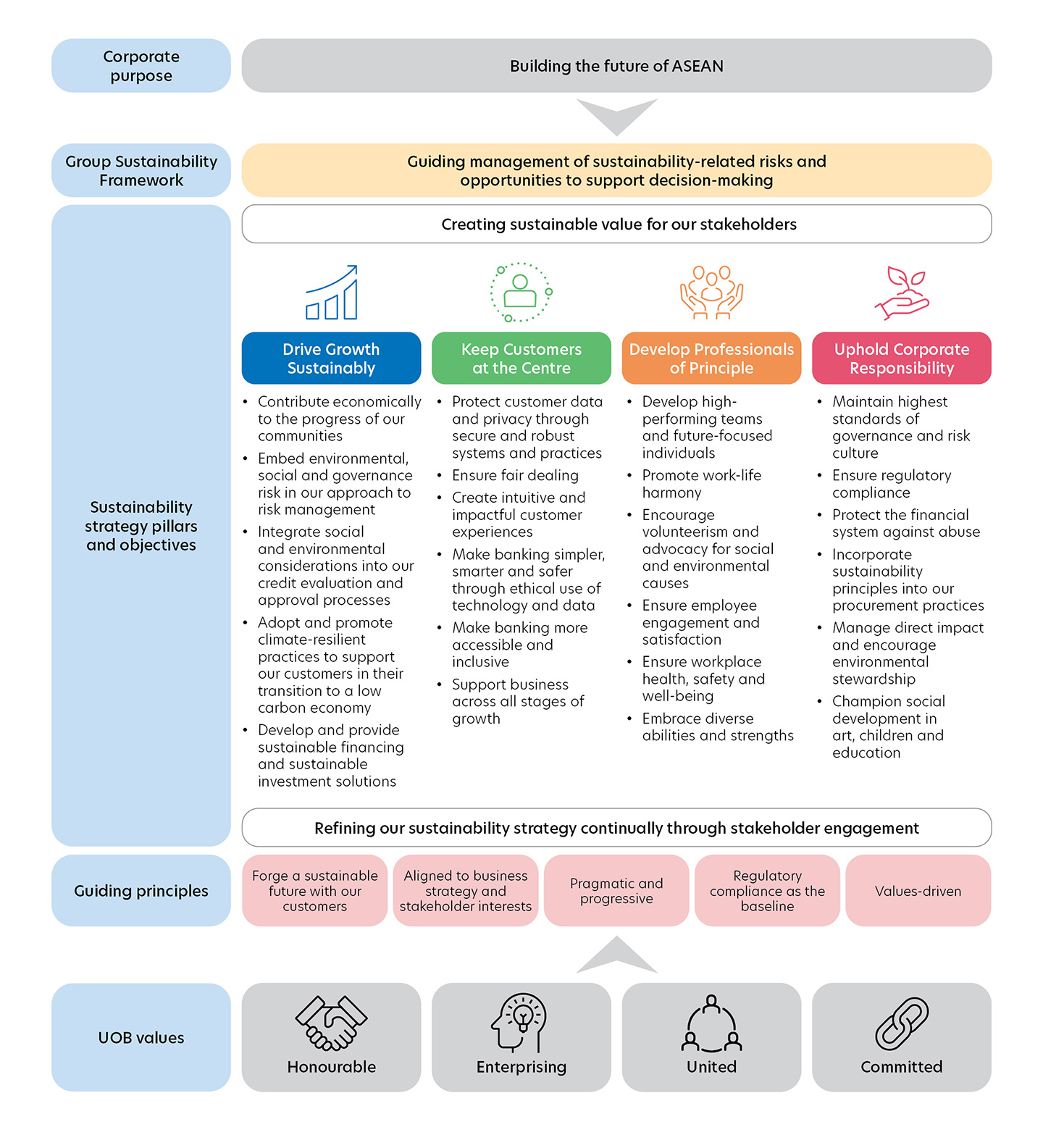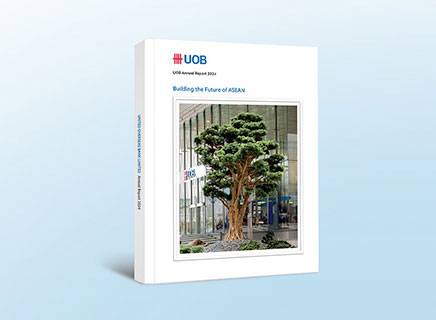
Strategy
At UOB, our sustainability strategy is underpinned by our corporate purpose and mirrors our business approach of balancing growth with responsibility.
Guiding principles
We are guided by five principles that act as a compass for how we address the material risks and opportunities which may impact our customers, colleagues, investors, suppliers and the communities in which we operate. As one of Asia's leading banks, UOB has a duty to contribute to the region’s long-term economic, social and environmental well-being. We also recognise that good corporate governance is essential for embedding sustainable business practices across the Group. This long-term, responsible approach is our heritage and is central to our business strategy and activities.
Forge a sustainable future with our customers
Aligned to business strategy and stakeholder interests

Engage our customers proactively to influence their sustainability practices for greater long-term resilience

Implement sustainability programmes to manage ESG risks and opportunities sensibly, in line with market and competitive realities

Align our sustainability approach with ESG policies and guidelines of governments in our key markets
The Four Pillars
The four pillars of our sustainability strategy arise from our fundamental strengths and are rooted in our values of Honour, Enterprise, Unity and Commitment. They reflect UOB’s expertise, the responsibilities we hold and the role we can play for the long-term benefit of our key stakeholders. Each of the pillars determines a set of objectives which we strive to achieve to ensure that we implement our strategy with clear plans and purpose.
Drive Growth Sustainably
In driving growth sustainably, we incorporate sustainability risk elements in our approach to risk management. This includes integrating ESG considerations into our credit evaluation and approval processes. We offer a range of sustainable solutions that can help our customers make a difference in their own communities. We are also progressively adopting as well as promoting climate-resilient practices which will support our customers in their own transition to a lower carbon economy. Beyond financing, we continue to make significant strides in growing our sustainable investing portfolio.
Keep Customers at the Centre
As we focus on doing what is right for customers, we ensure that Fair Dealing principles are entrenched in all aspects of our relationship with them. Keeping their best interests in mind, we harness technology and use data to make banking simpler, smarter, safer and more intuitive for them. By doing so, we aim to make banking more accessible and inclusive to individuals and businesses in the communities in which we operate. Standing by our customers also means that we must protect their data and privacy by maintaining the security and robustness of our systems and processes.
Develop Professionals of Principle
Our colleagues enable us to ensure the best outcome for our customers, our business and our community. Hence we develop professionals of principle – high-performing teams and individuals who are guided by our values. We embrace diverse strengths and abilities as these enhance our capabilities and enrich our competitiveness. We equip our colleagues to take on the challenges of tomorrow even as we care for their welfare and work-life harmony today. We also foster a sense of belonging among our colleagues by encouraging volunteerism and improving engagement and satisfaction.
Uphold Corporate Responsibility
We believe that as a responsible financial services provider, we must uphold corporate responsibility by maintaining the highest standards of governance and risk culture, ensuring regulatory compliance and protecting the financial system. We remain steadfast in our commitment to promote social development in the areas of art, children and education. Both in our own operations as well as among our stakeholders, we also actively encourage and support environmental stewardship efforts. Together, these efforts help us contribute to a strong and sustainable future for the wider community.
Climate strategy
Climate change is one of the most complex and defining issues of our time. As a leading financial institution in the region, we are committed to strengthening our portfolio resilience and to being a positive force in the fight against climate change.
ASEAN, our home region, is vulnerable to the growing intensity and magnitude of extreme physical weather events. Climate risks, both transition and physical, can manifest through various risk drivers and materialise at different time horizons. While chronic physical risk is expected to materalise in the long term, acute physical risk is event-driven and may manifest in the shorter term, evidenced by the physical risk events witnessed in the past few years such as the severe floods in Malaysia and Thailand.
The economic, environmental and social impacts resulting from climate change threaten to undo decades of developmental progress. As climate mitigation and adaptation measures scale up, these may also result in unintended consequences. Notably, while phasing out fossil fuels is a critical step to curb temperature rise, it may threaten energy security if implemented too abruptly.
Please refer to the IFRS SDS Index for our disclosures based on International Financial Reporting Standards (IFRS) S2 Climate-related Disclosures.
Nature strategy
ASEAN’s natural capital is being rapidly reduced by economic activities, at a faster rate than the rest of the world. The region risks material economic losses if natural capital loss continues unchecked and unmonitored. As a commercial bank with the power to mobilise private capital, we seek to play our role in contributing to and supporting activities that align with the Kunming-Montreal Global Biodiversity Framework’s vision of halting and reversing biodiversity loss by 2030 and living in harmony with nature by 2050.
Aligning with the Global Biodiversity Framework, UOB seeks to:
- strengthen our capacity in understanding and managing the nature risks that are material to our business;
- support our customers to make decisions that are similarly aligned;
- finance the scaling up of nature-related technologies and investments; and
- advocate nature’s importance in the world.
Read more about our nature strategy.
Please refer to the TNFD Index for our disclosures based on Task Force on Nature-related Financial Disclosures (TNFD) recommendations.
Alignment with the United Nations Sustainable Development Goals (UN SDGs)
The UN SDGs, or Global Goals, set the global agenda for sustainable development by 2030 and call for action by both the public and private sectors. UOB’s strategy and reporting are aligned with the 17 UN SDGs. We recognise that while UOB is better placed to contribute directly to a sub-set of the Global Goals, the broadening scope of our sustainable financing, responsible investing and impact investment activities and their corresponding positive impact enable us to align with all the Global Goals.
UOB also became a participant of the United Nations Global Compact in 2021. As a signatory, we support the Ten Principles of the Global Compact in the areas of human rights, labour, environment and anti-corruption. We are committed to integrating these principles into our culture, business strategy and daily operations.
UOB Sustainable Bond Framework
The UOB Sustainable Bond Framework, launched in March 2021, governs the issuance of any debt instruments, by UOB and our banking subsidiaries, in relation to our financing of green and social projects that contribute to the UN SDGs.
The framework covers:
- green bonds to finance and/or to refinance eligible green assets;
- social bonds to finance and/or to refinance eligible social assets; or
- sustainability bonds to finance and/or to refinance a mix of eligible green assets and eligible social assets.
It is in line with:
- the International Capital Market Association Green Bond Principles, Social Bond Principles and the Sustainability Bond Guidelines; and
- the ASEAN Green Bond Standards, Social Bond Standards and Sustainability Bond Standards.
Sustainalytics, an independent ESG research, ratings and analytics firm, provided the Second Party Opinion on the UOB Sustainable Bond Framework.
In August 2025, we published our fourth UOB Sustainability Bond Allocation and Impact Report to provide details of our US$1.5 billion sustainability bond issued in April 2021. The report shared the allocation of proceeds and the asset portfolio’s distribution by geography and sector as at 31 March 2025, as well as the positive impact generated. Ernst & Young LLP provided the independent limited assurance for both the UOB Sustainable Bond Framework and the UOB Sustainability Bond Allocation and Impact Report.
Related

Materiality
We identify material ESG factors which matter most to our business.

Stakeholder engagement
We engage our stakeholders through dialogue and collaboration.

Governance
Our sustainability governance framework guides our approach to conducting business.






